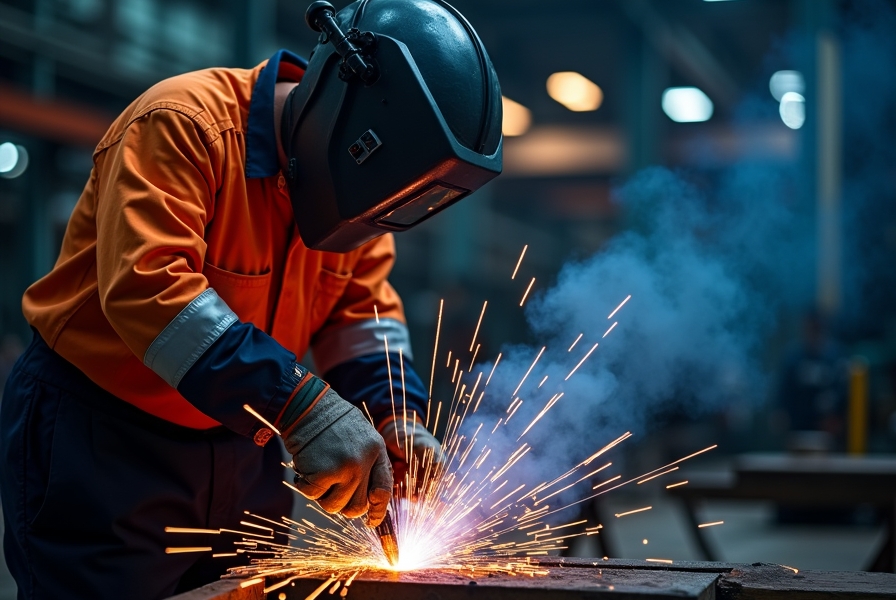Understanding the Role of a Marine Welder: Key Responsibilities
Thinking about a career as a marine welder? Marine welding offers dynamic opportunities for those who love hands-on work and the challenge of the ocean environment. You'll play a critical part in building, repairing, and maintaining ships, offshore rigs, submarines, and other marine structures. The duties require skill, precision, and a strong commitment to safety.
A marine welder’s daily work includes:
- Joining and repairing metal structures on ships, vessels, and marine platforms
- Fabricating and installing steel and aluminum components
- Interpreting blueprints, technical drawings, and welding symbols
- Preparing surfaces for welding, including cleaning and grinding metal
- Executing welding techniques such as MIG, TIG, Stick, and Flux-Cored Arc
- Inspecting completed welds for quality, strength, and safety compliance
- Performing underwater welding (for certified divers and highly trained welders)
- Following strict safety procedures, especially when working in confined spaces or at sea
- Maintaining welding equipment and ensuring tools are in top condition
Marine welders work in various environments—shipyards, dry docks, onboard vessels, and sometimes even underwater. You might collaborate with engineers, shipbuilders, pipefitters, and other marine professionals to keep ships and marine structures seaworthy and safe.
Essential Marine Welder Skills and Qualifications
To succeed as a marine welder, you need a solid technical foundation and a safety-first mindset. Here are the must-have skills for working in marine welding jobs:
- Proficiency with welding tools and techniques (MIG, TIG, Stick welding)
- Ability to read blueprints and technical drawings
- Knowledge of metals—especially steel, stainless steel, and aluminum
- Attention to detail for clean, strong welds
- Problem-solving abilities for fixing unexpected issues
- Physical fitness and stamina for heavy lifting and working in challenging conditions
- Familiarity with safety protocols, especially around gas cutting and high temperatures
- Teamwork and communication skills to coordinate with crew members
- If required, underwater welding certification and diving skills
Many marine welders start with a high school diploma or equivalent. Trade school, technical college, or apprenticeship programs focused on welding technology provide critical hands-on experience. Certifications from the American Welding Society (AWS) or other recognized bodies can boost your prospects, especially for offshore or underwater assignments.
Marine Welder Salary: What to Expect?
Salary for marine welders varies by experience, location, job type, and certifications. In the United States, marine welders earn competitive pay compared to many other skilled trades. The salary range reflects the specialized nature of marine work and the often challenging environments.
- Entry-Level Marine Welders: $38,000 – $52,000 per year
- Experienced Marine Welders: $55,000 – $75,000 per year
- Senior or Specialized Welders (like underwater welders): $80,000 – $120,000+ per year
According to the U.S. Bureau of Labor Statistics, the average annual wage for welders, cutters, solderers, and brazers was about $50,460 in 2022, but experienced marine welders or those working on offshore rigs often earn more due to hazards, overtime, and specialized skills.
Factors influencing marine welder pay:
- Location (shipyards on the coast or near ports may offer higher wages)
- Union versus non-union positions
- Company size and contract length
- Specialized certifications (like underwater welding)
Training and Certification Pathways for Marine Welders
Getting started in marine welding typically involves a combination of formal education and on-the-job training:
- Complete high school or GED
- Enroll in a welding trade school or technical training program (6 months–2 years)
- Participate in apprenticeships or internships for hands-on learning
- Earn welding certifications (AWS, ABS, or specific marine welding qualifications)
- For diving/underwater roles, complete commercial diving school and get certified in underwater welding
Marine welding employers look for safe work practices, solid technical skills, and a willingness to learn. Keeping certifications updated is key for career advancement and higher earning potential.
Work Environment and Career Growth in Marine Welding
Marine welders work in unique settings. Jobs are available in naval shipyards, commercial ship repair facilities, oil and gas platforms, and sometimes aboard ships at sea. Work can involve long hours, variable weather, and, in the case of underwater welding, challenging and hazardous environments.
Career paths for marine welders include:
- Shipyard supervisor
- Welding inspector or quality control specialist
- Underwater welder/diver
- Project manager for shipbuilding
- Technical instructor or welding trainer
Demand for skilled marine welders is steady as fleets and infrastructure need regular maintenance and upgrades. Specialized skills, especially in underwater welding, are always in high demand.
Frequently Asked Questions About Marine Welder Careers
What is the daily schedule like for a marine welder?
Marine welders often work 8- to 12-hour shifts, depending on project needs. Some jobs require night or weekend hours, especially during ship overhauls or emergency repairs. You may spend significant time outdoors, in tight spaces, or on scaffolding, depending on the project.
Is marine welding dangerous?
Marine welding has safety risks related to hot work, confined spaces, and potentially hazardous conditions at sea or underwater. Strict safety protocols, protective gear, and specialized training help reduce these risks. Attention to safety is a top priority in every marine welding job.
Do you need to be a strong swimmer to be a marine welder?
You do not need to be a strong swimmer for most shipyard or onshore marine welding jobs. However, if you pursue underwater welding, strong swimming skills and completion of commercial diving certification are required.
Which certifications are most valuable for marine welders?
Certifications from the American Welding Society (AWS), American Bureau of Shipping (ABS), and specialized underwater welding certifications are highly valued. These show you meet industry standards and can handle marine welding jobs safely and effectively.
Are marine welders in high demand?
Yes, marine welders remain in demand as shipping, defense, and offshore industries all require ongoing repairs, retrofits, and new vessel construction. Those with specialty skills, such as underwater welding or advanced certifications, have even more opportunities and higher earning potential.
Getting Started in a Marine Welding Career
If you enjoy hands-on work, love the sea, and excel with technical challenges, marine welding could be a rewarding path. Training and certifications jumpstart your journey. Experience brings even greater skill, higher pay, and new opportunities within this specialized field. With a focus on safety, attention to detail, and a willingness to learn, you can build a long-lasting and high-paying career as a marine welder.











.svg)



